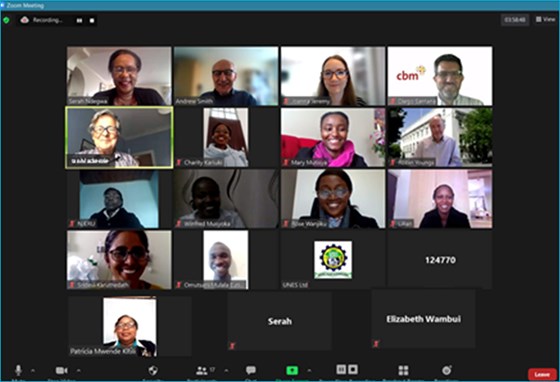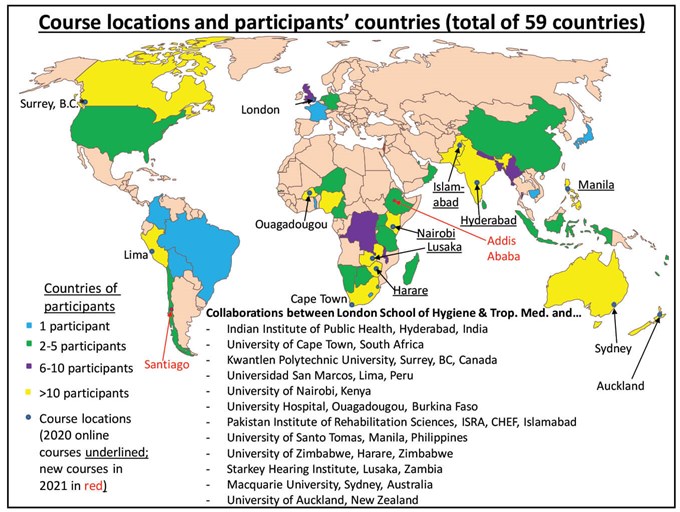The World Report on Hearing, published in 2021 by the WHO reports that 430 million people in the world have moderate or worse hearing loss, all of whom require rehabilitation [1]. Over 1.5 billion have any degree of hearing loss. By 2050, at least 700 million will require rehabilitation for hearing loss and almost 2.5 billion will be living with any degree of hearing loss.
Hearing loss is the third largest cause of years lived with disability (YLD) in the 2019 Global Burden of Disease Study, and 80% of those affected live in LMI countries [2]. Hearing loss may result in poverty in a vicious cycle for individuals and families. Currently, nearly 1 trillion international dollars are lost annually from unaddressed hearing loss. This figure will continue to increase unless action is taken. Hearing loss through the life-course can be addressed through appropriate prevention and rehabilitation but is generally neglected due to lack of awareness amongst health professionals, policy makers and the public – it can only be addressed on a large enough scale by adopting a public health approach, within the existing health system.
“There is a huge shortage of professionals working in hearing health in LMI countries and most need to be taught to use public health methods”
There is a huge shortage of professionals working in hearing health in LMI countries and most need to be taught to use public health methods. This need is more urgent following the unanimous ratification of the 2017 World Health Assembly Resolution on Prevention of Hearing Loss [3]. This will require a public health approach from all governments to implement these actions.
I reported in the ENT & Audiology News November/December 2017 issue [4] about a five-day training course called ‘Public Health Planning for Hearing Impairment (PHPHI)’ that a colleague, Dr Daksha Patel, and I set up at the International Centre for Evidence in Disability, at the London School of Hygiene & Tropical Medicine. The goal of the PHPHI course is to create a global network of health professionals trained in public hearing health to address the challenge of hearing loss. This is to expand capacity building for public health knowledge and skills in ear and hearing health (EHH) amongst health professionals and health planners.
“The goal of the PHPHI course is to create a global network of health professionals trained in public hearing health to address the challenge of hearing loss.”

Figure 1. Screenshot of faculty and participants on the Nairobi PHPHI 2021 online course, held in July.

Figure 2. PHPHI course locations and participants’ countries (total of 59 countries).
The course has developed specific content for public health approaches to hearing impairment around the world. In total, 1501 participants from 54 countries have been taught in 52 PHPHI courses in 13 centres between 2009 and the end of 2020. There are nine centres in LMI countries and four centres in high-income countries. The majority of participants come from LMI countries (see Figure 2).
The courses have attracted academics and professionals in otology and audiology and allied fields, and health planners from Ministries of Health and Education, and Non-Governmental Organizations.
Key outputs from the course include:
- Training health professionals and local faculty in public health approaches to hearing health.
- Raising awareness and advocacy for hearing loss at a local level.
- Local assessment of needs and gaps within district health programmes.
- Initiating the development of national or local programmes or projects for hearing health.
The local course directors for all the course venues that were due to be held in 2020 wanted to continue running the PHPHI course during the pandemic. In 2020 the courses in Hyderabad (India), Nairobi (Kenya), Islamabad (Pakistan), Manila (Philippines), and Harare (Zimbabwe) were converted to online teaching and successfully delivered online. All these courses were held online again in 2021.
Lessons learned for online courses were as follows:
- IT staff experienced in online teaching platforms such as Zoom and Microsoft Teams should be involved in the planning stage and readily available whilst the course is being taught.
- ‘Dry-run’ sessions with IT staff should be held for course organisers and external faculty to test online links and techniques for online presentations. Dry runs will also help participants inexperienced in online etiquette and training. Guidelines on these topics should be distributed in advance to participants and presenters.
- Presentations should be configured for mobile phones as well as laptops.
- A Cloud-based repository should be set up by the local host or LSHTM for each course to hold and share presentation files.
- Actions that maintain the interest and engagement of participants online include shorter presentations, more interactive discussions, more exercises, and greater use of videos and case studies.
Although face-to-face teaching is usually considered the ideal method, we found that online courses do have several advantages:
- The catchment area for participants is much greater and can include people from other countries in neighbouring time zones.
- A wider range of experts from distant locations can be included in the teaching faculty.
- Online courses allow greater flexibility in daily timing.
- An online course is less expensive to run because travel and accommodation costs for external faculty and distant participants are avoided or reduced.
- The carbon footprint of an online course is likely to be less than a face-to-face course.
- It is feasible to run an online course more than once during a calendar year.
I am very pleased that the PHPHI course will be held for the first time in Addis Ababa, Ethiopia in October 2021 and in Santiago, Chile in November 2021.
Future planning for the PHPHI course
I am in discussions to establish new course locations in Antananarivo (Madagascar), Kuala Lumpur (Malaysia), Kathmandu (Nepal), Muscat (Oman), and Kigali (Rwanda) in 2022.
I look forward to the continued support for the PHPHI online course held in collaboration between each local host university/institution and the International Centre for Evidence in Disability at the London School of Hygiene and Tropical Medicine.
Further information about the PHPHI course programme, including more details of the online courses can be found at:
www.lshtm.ac.uk/research/
centres/international-centre-evidence
-disability/study-iced.
References
1. World Report on Hearing. Geneva: World Health Organization 2021.
www.who.int/publications/i/
item/world-report-on-hearing
2. Hearing loss prevalence and years lived with disability, 1990–2019: findings from the Global Burden of Disease Study 2019. Lancet 2021;397(10278):996-1009.
3. WHA Resolution on Prevention of Deafness and Hearing Loss. 31 May 2017
http://apps.who.int/gb/ebwha/pdf_files/
WHA70/A70_R13-en.pdf?ua=1
4. Smith A. Public Health Planning for Hearing Impairment. ENT & Audiology News 2017;26(5):76-77.
All links last accessed January 2022.
 Achievements by participants as a result of taking the PHPHI course
Achievements by participants as a result of taking the PHPHI course
There are two kinds of achievements observed amongst the participants who had completed the PHPHI course in Hyderabad over the past 10 years: immediate and subsequent. Public Health and planning for public health in general is not part of the curriculum in any rehabilitation-related undergraduate courses in India. Hence, gaining that knowledge from the PHPHI is an immediate achievement. The subsequent achievements are related to the application of this knowledge in:
a. Transfer of knowledge
b. Securing funding for planning
c. Application in practice
Sureshkumar Kamalakannan, BOT, MPH, PhD,
Associate Professor, Indian Institute of Public Health - Hyderabad, Public Health Foundation of India.





